Legal Issues and Relevant Laws in Contract Formation
VerifiedAdded on 2023/01/20
|10
|3174
|79
AI Summary
This document discusses the legal issues and relevant laws in contract formation, including the elements of a valid contract and the importance of legal intention and consideration. It also provides a step-by-step analysis of two solutions to a legal issue.
Contribute Materials
Your contribution can guide someone’s learning journey. Share your
documents today.
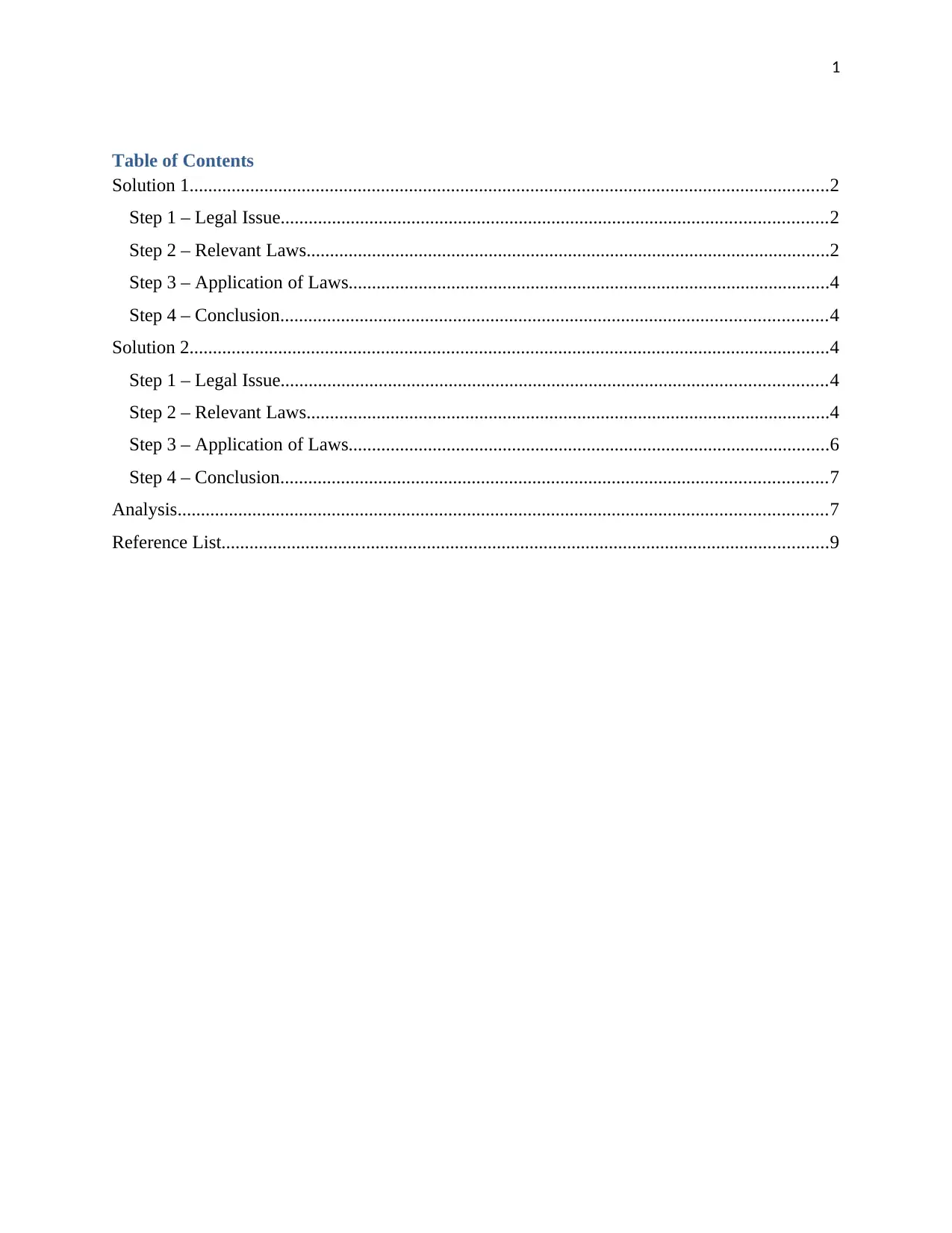
1
Table of Contents
Solution 1.........................................................................................................................................2
Step 1 – Legal Issue.....................................................................................................................2
Step 2 – Relevant Laws................................................................................................................2
Step 3 – Application of Laws.......................................................................................................4
Step 4 – Conclusion.....................................................................................................................4
Solution 2.........................................................................................................................................4
Step 1 – Legal Issue.....................................................................................................................4
Step 2 – Relevant Laws................................................................................................................4
Step 3 – Application of Laws.......................................................................................................6
Step 4 – Conclusion.....................................................................................................................7
Analysis...........................................................................................................................................7
Reference List..................................................................................................................................9
Table of Contents
Solution 1.........................................................................................................................................2
Step 1 – Legal Issue.....................................................................................................................2
Step 2 – Relevant Laws................................................................................................................2
Step 3 – Application of Laws.......................................................................................................4
Step 4 – Conclusion.....................................................................................................................4
Solution 2.........................................................................................................................................4
Step 1 – Legal Issue.....................................................................................................................4
Step 2 – Relevant Laws................................................................................................................4
Step 3 – Application of Laws.......................................................................................................6
Step 4 – Conclusion.....................................................................................................................7
Analysis...........................................................................................................................................7
Reference List..................................................................................................................................9
Secure Best Marks with AI Grader
Need help grading? Try our AI Grader for instant feedback on your assignments.
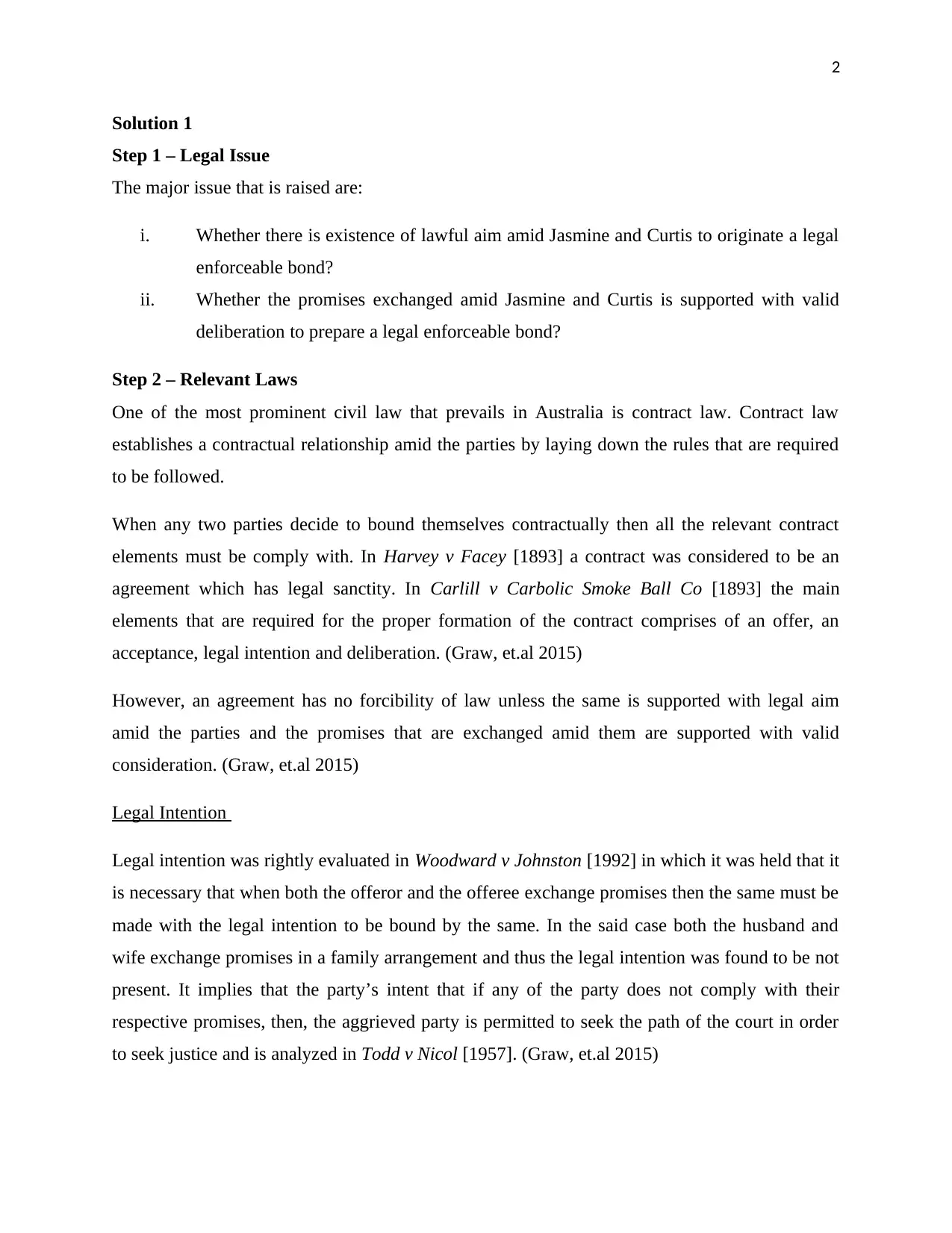
2
Solution 1
Step 1 – Legal Issue
The major issue that is raised are:
i. Whether there is existence of lawful aim amid Jasmine and Curtis to originate a legal
enforceable bond?
ii. Whether the promises exchanged amid Jasmine and Curtis is supported with valid
deliberation to prepare a legal enforceable bond?
Step 2 – Relevant Laws
One of the most prominent civil law that prevails in Australia is contract law. Contract law
establishes a contractual relationship amid the parties by laying down the rules that are required
to be followed.
When any two parties decide to bound themselves contractually then all the relevant contract
elements must be comply with. In Harvey v Facey [1893] a contract was considered to be an
agreement which has legal sanctity. In Carlill v Carbolic Smoke Ball Co [1893] the main
elements that are required for the proper formation of the contract comprises of an offer, an
acceptance, legal intention and deliberation. (Graw, et.al 2015)
However, an agreement has no forcibility of law unless the same is supported with legal aim
amid the parties and the promises that are exchanged amid them are supported with valid
consideration. (Graw, et.al 2015)
Legal Intention
Legal intention was rightly evaluated in Woodward v Johnston [1992] in which it was held that it
is necessary that when both the offeror and the offeree exchange promises then the same must be
made with the legal intention to be bound by the same. In the said case both the husband and
wife exchange promises in a family arrangement and thus the legal intention was found to be not
present. It implies that the party’s intent that if any of the party does not comply with their
respective promises, then, the aggrieved party is permitted to seek the path of the court in order
to seek justice and is analyzed in Todd v Nicol [1957]. (Graw, et.al 2015)
Solution 1
Step 1 – Legal Issue
The major issue that is raised are:
i. Whether there is existence of lawful aim amid Jasmine and Curtis to originate a legal
enforceable bond?
ii. Whether the promises exchanged amid Jasmine and Curtis is supported with valid
deliberation to prepare a legal enforceable bond?
Step 2 – Relevant Laws
One of the most prominent civil law that prevails in Australia is contract law. Contract law
establishes a contractual relationship amid the parties by laying down the rules that are required
to be followed.
When any two parties decide to bound themselves contractually then all the relevant contract
elements must be comply with. In Harvey v Facey [1893] a contract was considered to be an
agreement which has legal sanctity. In Carlill v Carbolic Smoke Ball Co [1893] the main
elements that are required for the proper formation of the contract comprises of an offer, an
acceptance, legal intention and deliberation. (Graw, et.al 2015)
However, an agreement has no forcibility of law unless the same is supported with legal aim
amid the parties and the promises that are exchanged amid them are supported with valid
consideration. (Graw, et.al 2015)
Legal Intention
Legal intention was rightly evaluated in Woodward v Johnston [1992] in which it was held that it
is necessary that when both the offeror and the offeree exchange promises then the same must be
made with the legal intention to be bound by the same. In the said case both the husband and
wife exchange promises in a family arrangement and thus the legal intention was found to be not
present. It implies that the party’s intent that if any of the party does not comply with their
respective promises, then, the aggrieved party is permitted to seek the path of the court in order
to seek justice and is analyzed in Todd v Nicol [1957]. (Graw, et.al 2015)
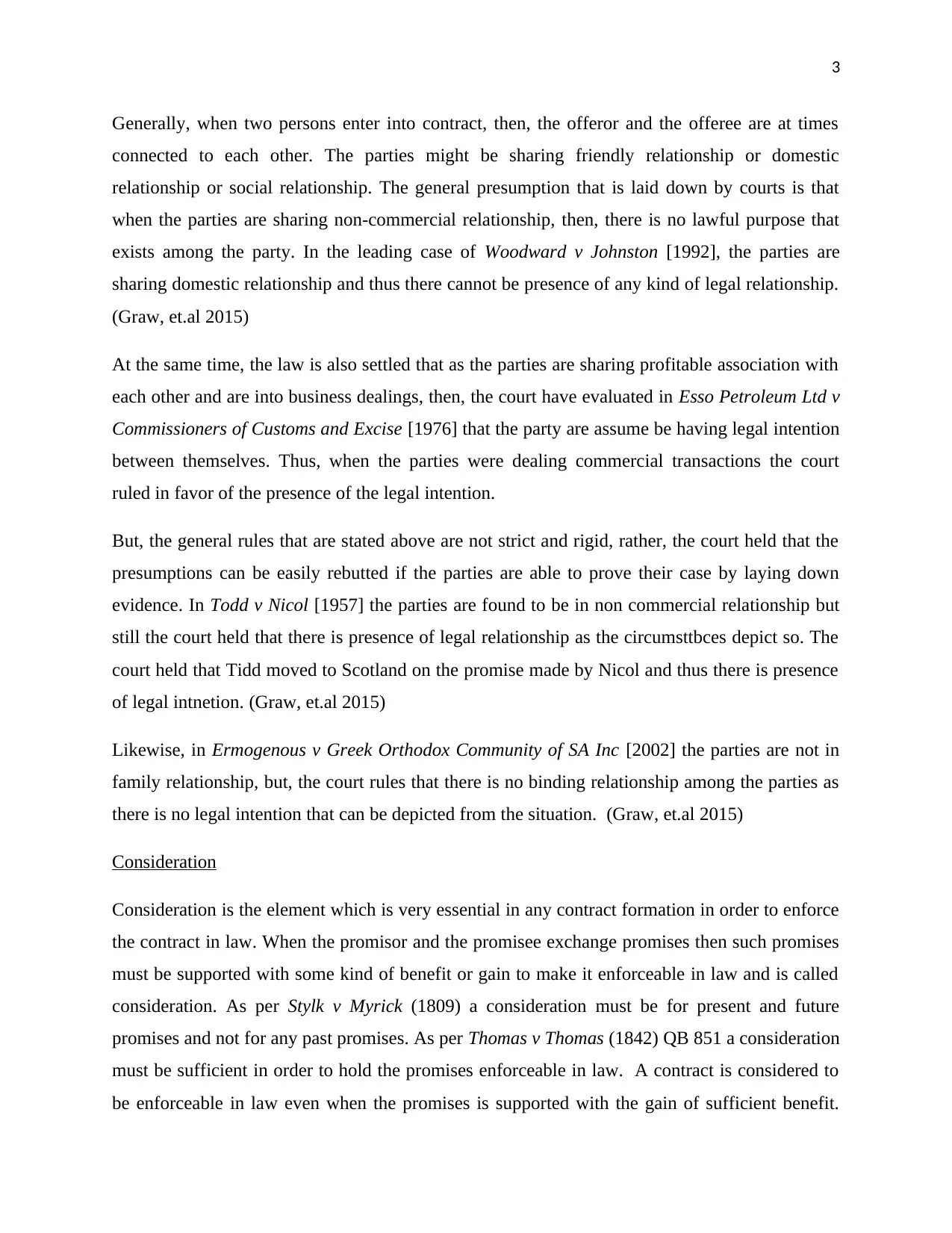
3
Generally, when two persons enter into contract, then, the offeror and the offeree are at times
connected to each other. The parties might be sharing friendly relationship or domestic
relationship or social relationship. The general presumption that is laid down by courts is that
when the parties are sharing non-commercial relationship, then, there is no lawful purpose that
exists among the party. In the leading case of Woodward v Johnston [1992], the parties are
sharing domestic relationship and thus there cannot be presence of any kind of legal relationship.
(Graw, et.al 2015)
At the same time, the law is also settled that as the parties are sharing profitable association with
each other and are into business dealings, then, the court have evaluated in Esso Petroleum Ltd v
Commissioners of Customs and Excise [1976] that the party are assume be having legal intention
between themselves. Thus, when the parties were dealing commercial transactions the court
ruled in favor of the presence of the legal intention.
But, the general rules that are stated above are not strict and rigid, rather, the court held that the
presumptions can be easily rebutted if the parties are able to prove their case by laying down
evidence. In Todd v Nicol [1957] the parties are found to be in non commercial relationship but
still the court held that there is presence of legal relationship as the circumsttbces depict so. The
court held that Tidd moved to Scotland on the promise made by Nicol and thus there is presence
of legal intnetion. (Graw, et.al 2015)
Likewise, in Ermogenous v Greek Orthodox Community of SA Inc [2002] the parties are not in
family relationship, but, the court rules that there is no binding relationship among the parties as
there is no legal intention that can be depicted from the situation. (Graw, et.al 2015)
Consideration
Consideration is the element which is very essential in any contract formation in order to enforce
the contract in law. When the promisor and the promisee exchange promises then such promises
must be supported with some kind of benefit or gain to make it enforceable in law and is called
consideration. As per Stylk v Myrick (1809) a consideration must be for present and future
promises and not for any past promises. As per Thomas v Thomas (1842) QB 851 a consideration
must be sufficient in order to hold the promises enforceable in law. A contract is considered to
be enforceable in law even when the promises is supported with the gain of sufficient benefit.
Generally, when two persons enter into contract, then, the offeror and the offeree are at times
connected to each other. The parties might be sharing friendly relationship or domestic
relationship or social relationship. The general presumption that is laid down by courts is that
when the parties are sharing non-commercial relationship, then, there is no lawful purpose that
exists among the party. In the leading case of Woodward v Johnston [1992], the parties are
sharing domestic relationship and thus there cannot be presence of any kind of legal relationship.
(Graw, et.al 2015)
At the same time, the law is also settled that as the parties are sharing profitable association with
each other and are into business dealings, then, the court have evaluated in Esso Petroleum Ltd v
Commissioners of Customs and Excise [1976] that the party are assume be having legal intention
between themselves. Thus, when the parties were dealing commercial transactions the court
ruled in favor of the presence of the legal intention.
But, the general rules that are stated above are not strict and rigid, rather, the court held that the
presumptions can be easily rebutted if the parties are able to prove their case by laying down
evidence. In Todd v Nicol [1957] the parties are found to be in non commercial relationship but
still the court held that there is presence of legal relationship as the circumsttbces depict so. The
court held that Tidd moved to Scotland on the promise made by Nicol and thus there is presence
of legal intnetion. (Graw, et.al 2015)
Likewise, in Ermogenous v Greek Orthodox Community of SA Inc [2002] the parties are not in
family relationship, but, the court rules that there is no binding relationship among the parties as
there is no legal intention that can be depicted from the situation. (Graw, et.al 2015)
Consideration
Consideration is the element which is very essential in any contract formation in order to enforce
the contract in law. When the promisor and the promisee exchange promises then such promises
must be supported with some kind of benefit or gain to make it enforceable in law and is called
consideration. As per Stylk v Myrick (1809) a consideration must be for present and future
promises and not for any past promises. As per Thomas v Thomas (1842) QB 851 a consideration
must be sufficient in order to hold the promises enforceable in law. A contract is considered to
be enforceable in law even when the promises is supported with the gain of sufficient benefit.
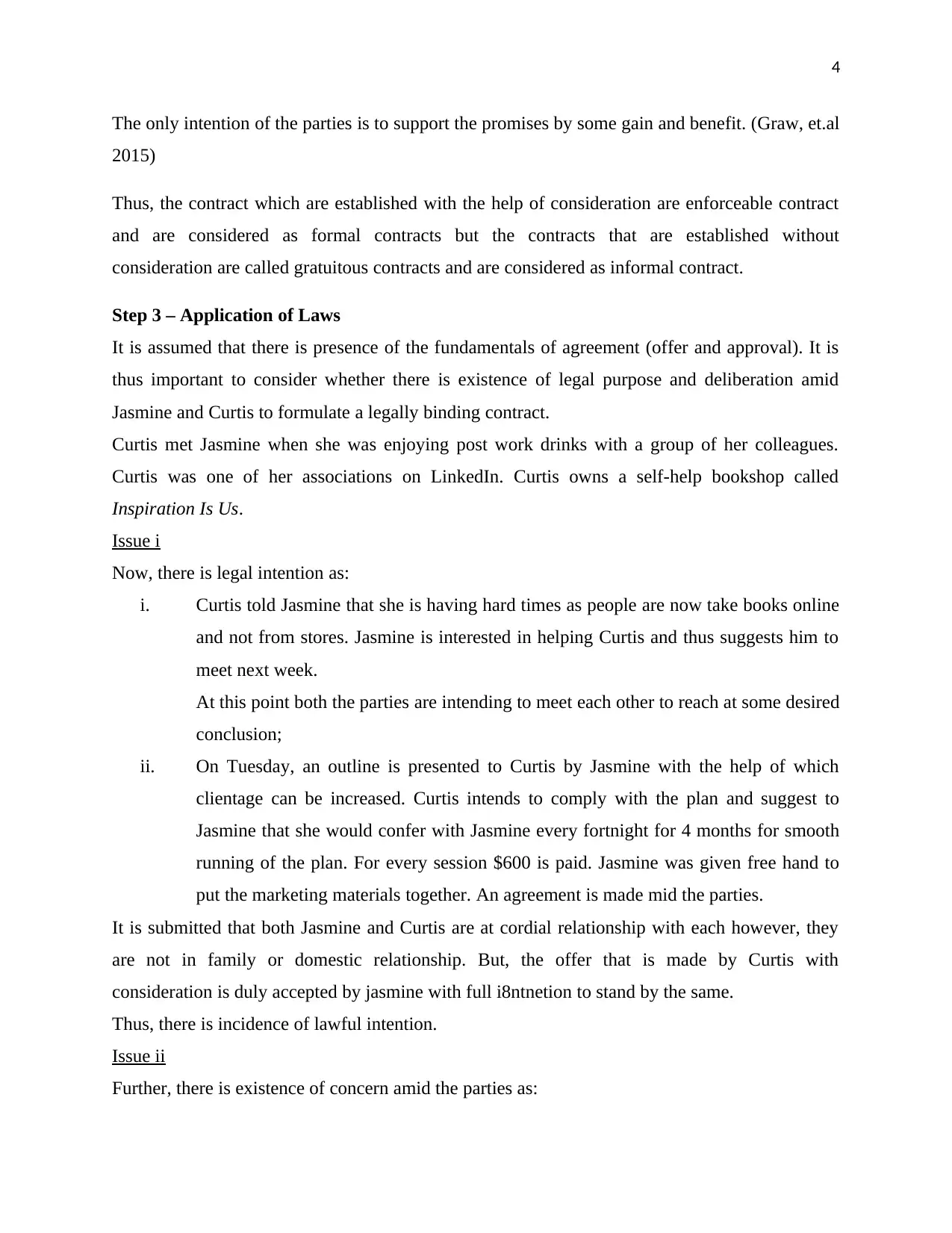
4
The only intention of the parties is to support the promises by some gain and benefit. (Graw, et.al
2015)
Thus, the contract which are established with the help of consideration are enforceable contract
and are considered as formal contracts but the contracts that are established without
consideration are called gratuitous contracts and are considered as informal contract.
Step 3 – Application of Laws
It is assumed that there is presence of the fundamentals of agreement (offer and approval). It is
thus important to consider whether there is existence of legal purpose and deliberation amid
Jasmine and Curtis to formulate a legally binding contract.
Curtis met Jasmine when she was enjoying post work drinks with a group of her colleagues.
Curtis was one of her associations on LinkedIn. Curtis owns a self-help bookshop called
Inspiration Is Us.
Issue i
Now, there is legal intention as:
i. Curtis told Jasmine that she is having hard times as people are now take books online
and not from stores. Jasmine is interested in helping Curtis and thus suggests him to
meet next week.
At this point both the parties are intending to meet each other to reach at some desired
conclusion;
ii. On Tuesday, an outline is presented to Curtis by Jasmine with the help of which
clientage can be increased. Curtis intends to comply with the plan and suggest to
Jasmine that she would confer with Jasmine every fortnight for 4 months for smooth
running of the plan. For every session $600 is paid. Jasmine was given free hand to
put the marketing materials together. An agreement is made mid the parties.
It is submitted that both Jasmine and Curtis are at cordial relationship with each however, they
are not in family or domestic relationship. But, the offer that is made by Curtis with
consideration is duly accepted by jasmine with full i8ntnetion to stand by the same.
Thus, there is incidence of lawful intention.
Issue ii
Further, there is existence of concern amid the parties as:
The only intention of the parties is to support the promises by some gain and benefit. (Graw, et.al
2015)
Thus, the contract which are established with the help of consideration are enforceable contract
and are considered as formal contracts but the contracts that are established without
consideration are called gratuitous contracts and are considered as informal contract.
Step 3 – Application of Laws
It is assumed that there is presence of the fundamentals of agreement (offer and approval). It is
thus important to consider whether there is existence of legal purpose and deliberation amid
Jasmine and Curtis to formulate a legally binding contract.
Curtis met Jasmine when she was enjoying post work drinks with a group of her colleagues.
Curtis was one of her associations on LinkedIn. Curtis owns a self-help bookshop called
Inspiration Is Us.
Issue i
Now, there is legal intention as:
i. Curtis told Jasmine that she is having hard times as people are now take books online
and not from stores. Jasmine is interested in helping Curtis and thus suggests him to
meet next week.
At this point both the parties are intending to meet each other to reach at some desired
conclusion;
ii. On Tuesday, an outline is presented to Curtis by Jasmine with the help of which
clientage can be increased. Curtis intends to comply with the plan and suggest to
Jasmine that she would confer with Jasmine every fortnight for 4 months for smooth
running of the plan. For every session $600 is paid. Jasmine was given free hand to
put the marketing materials together. An agreement is made mid the parties.
It is submitted that both Jasmine and Curtis are at cordial relationship with each however, they
are not in family or domestic relationship. But, the offer that is made by Curtis with
consideration is duly accepted by jasmine with full i8ntnetion to stand by the same.
Thus, there is incidence of lawful intention.
Issue ii
Further, there is existence of concern amid the parties as:
Secure Best Marks with AI Grader
Need help grading? Try our AI Grader for instant feedback on your assignments.
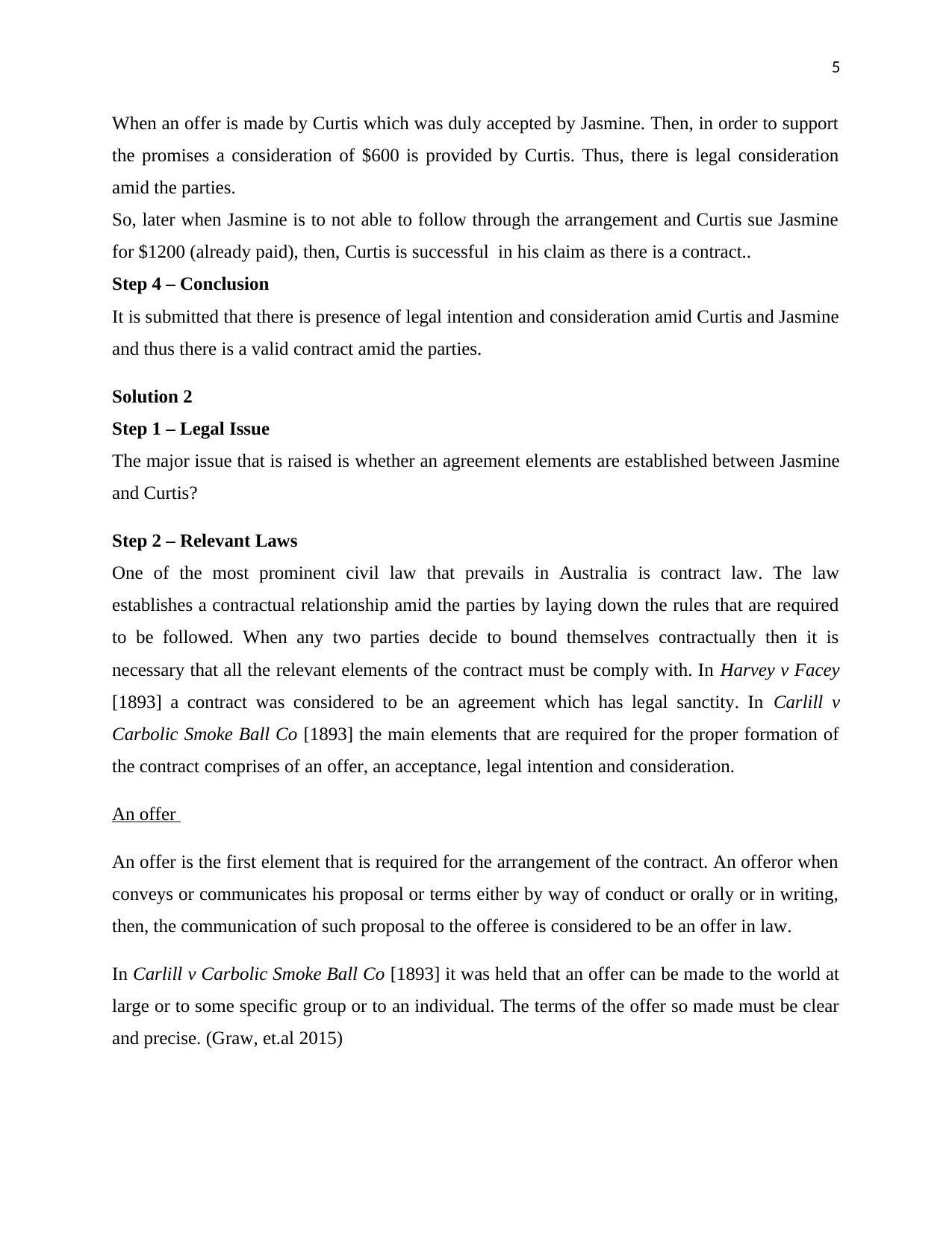
5
When an offer is made by Curtis which was duly accepted by Jasmine. Then, in order to support
the promises a consideration of $600 is provided by Curtis. Thus, there is legal consideration
amid the parties.
So, later when Jasmine is to not able to follow through the arrangement and Curtis sue Jasmine
for $1200 (already paid), then, Curtis is successful in his claim as there is a contract..
Step 4 – Conclusion
It is submitted that there is presence of legal intention and consideration amid Curtis and Jasmine
and thus there is a valid contract amid the parties.
Solution 2
Step 1 – Legal Issue
The major issue that is raised is whether an agreement elements are established between Jasmine
and Curtis?
Step 2 – Relevant Laws
One of the most prominent civil law that prevails in Australia is contract law. The law
establishes a contractual relationship amid the parties by laying down the rules that are required
to be followed. When any two parties decide to bound themselves contractually then it is
necessary that all the relevant elements of the contract must be comply with. In Harvey v Facey
[1893] a contract was considered to be an agreement which has legal sanctity. In Carlill v
Carbolic Smoke Ball Co [1893] the main elements that are required for the proper formation of
the contract comprises of an offer, an acceptance, legal intention and consideration.
An offer
An offer is the first element that is required for the arrangement of the contract. An offeror when
conveys or communicates his proposal or terms either by way of conduct or orally or in writing,
then, the communication of such proposal to the offeree is considered to be an offer in law.
In Carlill v Carbolic Smoke Ball Co [1893] it was held that an offer can be made to the world at
large or to some specific group or to an individual. The terms of the offer so made must be clear
and precise. (Graw, et.al 2015)
When an offer is made by Curtis which was duly accepted by Jasmine. Then, in order to support
the promises a consideration of $600 is provided by Curtis. Thus, there is legal consideration
amid the parties.
So, later when Jasmine is to not able to follow through the arrangement and Curtis sue Jasmine
for $1200 (already paid), then, Curtis is successful in his claim as there is a contract..
Step 4 – Conclusion
It is submitted that there is presence of legal intention and consideration amid Curtis and Jasmine
and thus there is a valid contract amid the parties.
Solution 2
Step 1 – Legal Issue
The major issue that is raised is whether an agreement elements are established between Jasmine
and Curtis?
Step 2 – Relevant Laws
One of the most prominent civil law that prevails in Australia is contract law. The law
establishes a contractual relationship amid the parties by laying down the rules that are required
to be followed. When any two parties decide to bound themselves contractually then it is
necessary that all the relevant elements of the contract must be comply with. In Harvey v Facey
[1893] a contract was considered to be an agreement which has legal sanctity. In Carlill v
Carbolic Smoke Ball Co [1893] the main elements that are required for the proper formation of
the contract comprises of an offer, an acceptance, legal intention and consideration.
An offer
An offer is the first element that is required for the arrangement of the contract. An offeror when
conveys or communicates his proposal or terms either by way of conduct or orally or in writing,
then, the communication of such proposal to the offeree is considered to be an offer in law.
In Carlill v Carbolic Smoke Ball Co [1893] it was held that an offer can be made to the world at
large or to some specific group or to an individual. The terms of the offer so made must be clear
and precise. (Graw, et.al 2015)
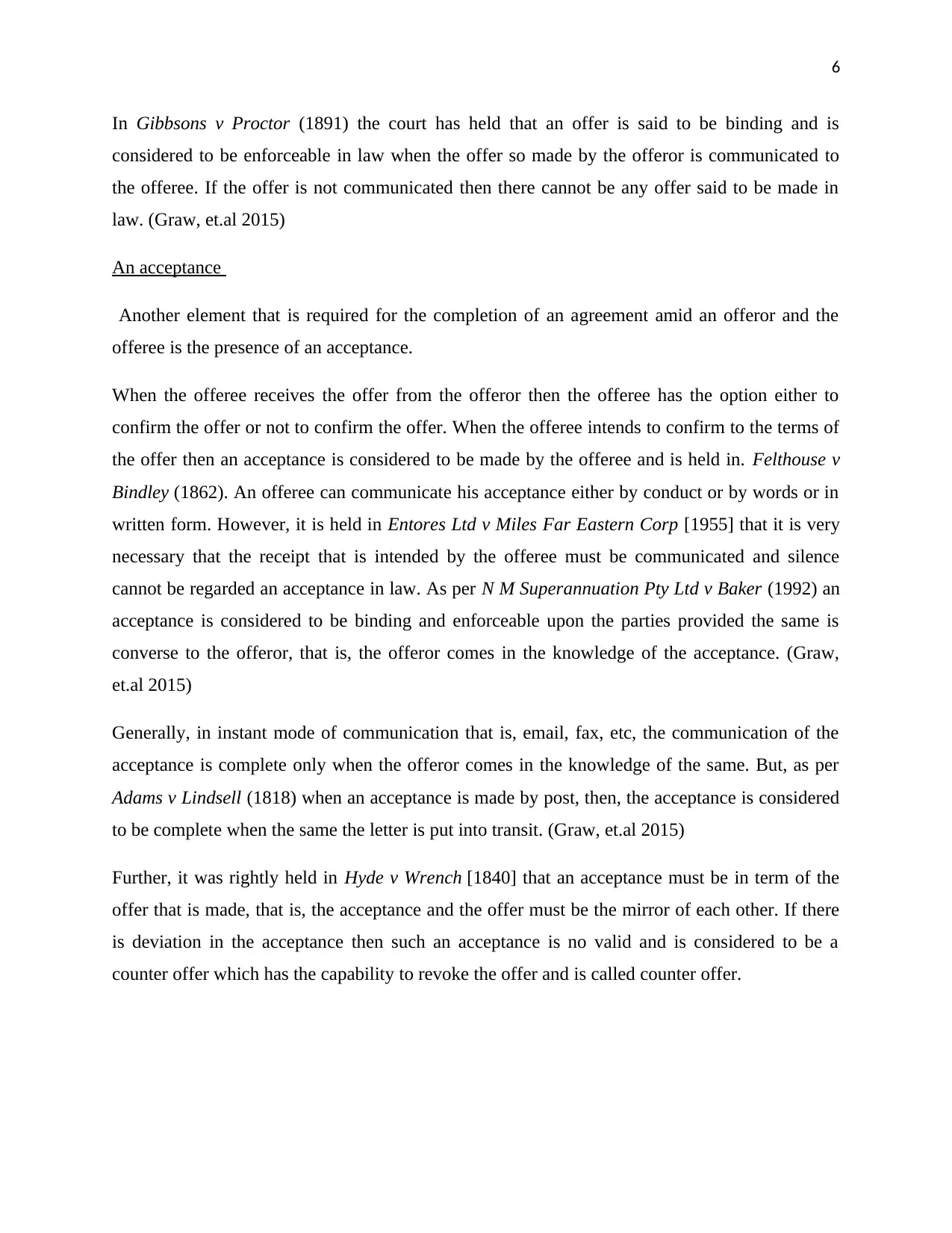
6
In Gibbsons v Proctor (1891) the court has held that an offer is said to be binding and is
considered to be enforceable in law when the offer so made by the offeror is communicated to
the offeree. If the offer is not communicated then there cannot be any offer said to be made in
law. (Graw, et.al 2015)
An acceptance
Another element that is required for the completion of an agreement amid an offeror and the
offeree is the presence of an acceptance.
When the offeree receives the offer from the offeror then the offeree has the option either to
confirm the offer or not to confirm the offer. When the offeree intends to confirm to the terms of
the offer then an acceptance is considered to be made by the offeree and is held in. Felthouse v
Bindley (1862). An offeree can communicate his acceptance either by conduct or by words or in
written form. However, it is held in Entores Ltd v Miles Far Eastern Corp [1955] that it is very
necessary that the receipt that is intended by the offeree must be communicated and silence
cannot be regarded an acceptance in law. As per N M Superannuation Pty Ltd v Baker (1992) an
acceptance is considered to be binding and enforceable upon the parties provided the same is
converse to the offeror, that is, the offeror comes in the knowledge of the acceptance. (Graw,
et.al 2015)
Generally, in instant mode of communication that is, email, fax, etc, the communication of the
acceptance is complete only when the offeror comes in the knowledge of the same. But, as per
Adams v Lindsell (1818) when an acceptance is made by post, then, the acceptance is considered
to be complete when the same the letter is put into transit. (Graw, et.al 2015)
Further, it was rightly held in Hyde v Wrench [1840] that an acceptance must be in term of the
offer that is made, that is, the acceptance and the offer must be the mirror of each other. If there
is deviation in the acceptance then such an acceptance is no valid and is considered to be a
counter offer which has the capability to revoke the offer and is called counter offer.
In Gibbsons v Proctor (1891) the court has held that an offer is said to be binding and is
considered to be enforceable in law when the offer so made by the offeror is communicated to
the offeree. If the offer is not communicated then there cannot be any offer said to be made in
law. (Graw, et.al 2015)
An acceptance
Another element that is required for the completion of an agreement amid an offeror and the
offeree is the presence of an acceptance.
When the offeree receives the offer from the offeror then the offeree has the option either to
confirm the offer or not to confirm the offer. When the offeree intends to confirm to the terms of
the offer then an acceptance is considered to be made by the offeree and is held in. Felthouse v
Bindley (1862). An offeree can communicate his acceptance either by conduct or by words or in
written form. However, it is held in Entores Ltd v Miles Far Eastern Corp [1955] that it is very
necessary that the receipt that is intended by the offeree must be communicated and silence
cannot be regarded an acceptance in law. As per N M Superannuation Pty Ltd v Baker (1992) an
acceptance is considered to be binding and enforceable upon the parties provided the same is
converse to the offeror, that is, the offeror comes in the knowledge of the acceptance. (Graw,
et.al 2015)
Generally, in instant mode of communication that is, email, fax, etc, the communication of the
acceptance is complete only when the offeror comes in the knowledge of the same. But, as per
Adams v Lindsell (1818) when an acceptance is made by post, then, the acceptance is considered
to be complete when the same the letter is put into transit. (Graw, et.al 2015)
Further, it was rightly held in Hyde v Wrench [1840] that an acceptance must be in term of the
offer that is made, that is, the acceptance and the offer must be the mirror of each other. If there
is deviation in the acceptance then such an acceptance is no valid and is considered to be a
counter offer which has the capability to revoke the offer and is called counter offer.
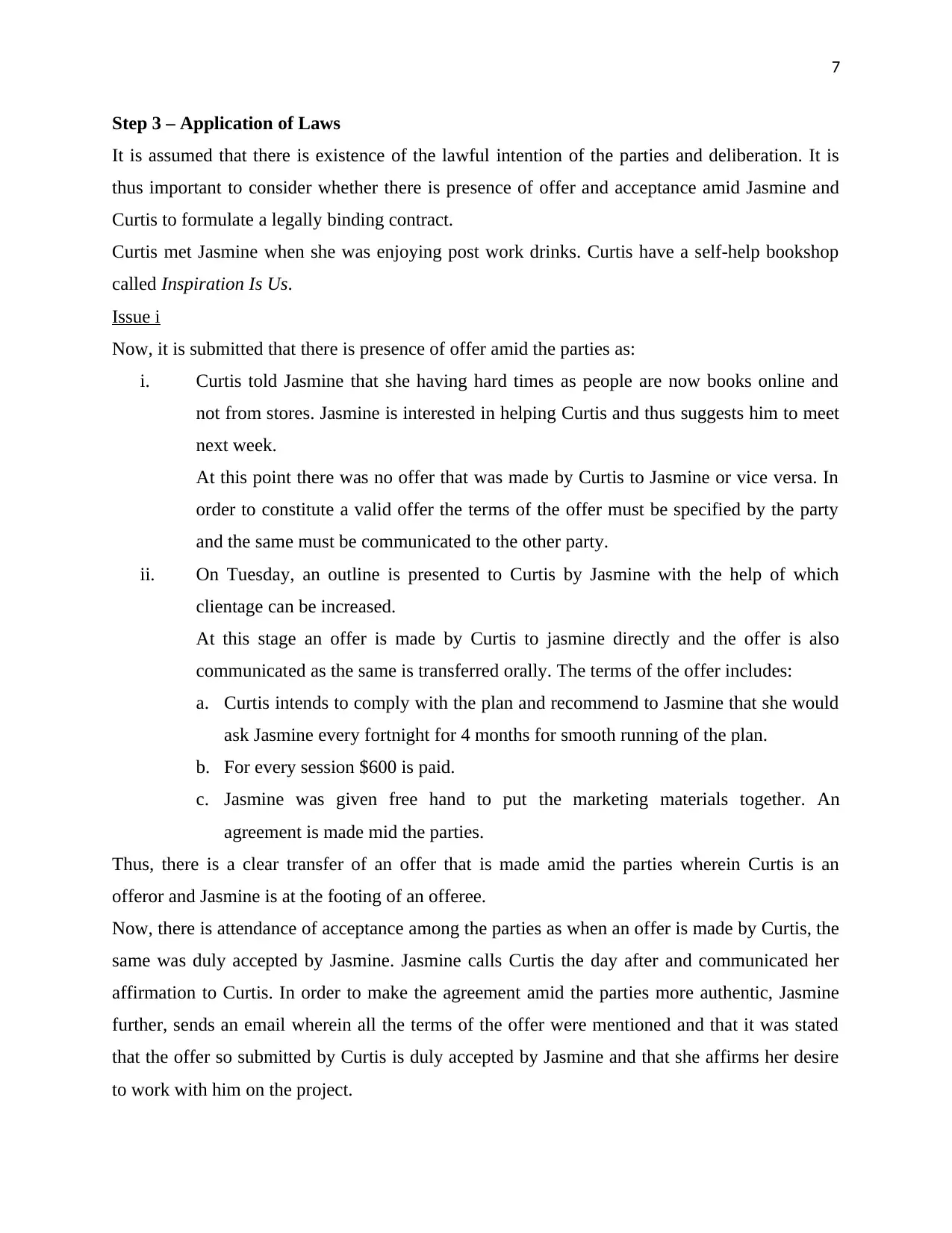
7
Step 3 – Application of Laws
It is assumed that there is existence of the lawful intention of the parties and deliberation. It is
thus important to consider whether there is presence of offer and acceptance amid Jasmine and
Curtis to formulate a legally binding contract.
Curtis met Jasmine when she was enjoying post work drinks. Curtis have a self-help bookshop
called Inspiration Is Us.
Issue i
Now, it is submitted that there is presence of offer amid the parties as:
i. Curtis told Jasmine that she having hard times as people are now books online and
not from stores. Jasmine is interested in helping Curtis and thus suggests him to meet
next week.
At this point there was no offer that was made by Curtis to Jasmine or vice versa. In
order to constitute a valid offer the terms of the offer must be specified by the party
and the same must be communicated to the other party.
ii. On Tuesday, an outline is presented to Curtis by Jasmine with the help of which
clientage can be increased.
At this stage an offer is made by Curtis to jasmine directly and the offer is also
communicated as the same is transferred orally. The terms of the offer includes:
a. Curtis intends to comply with the plan and recommend to Jasmine that she would
ask Jasmine every fortnight for 4 months for smooth running of the plan.
b. For every session $600 is paid.
c. Jasmine was given free hand to put the marketing materials together. An
agreement is made mid the parties.
Thus, there is a clear transfer of an offer that is made amid the parties wherein Curtis is an
offeror and Jasmine is at the footing of an offeree.
Now, there is attendance of acceptance among the parties as when an offer is made by Curtis, the
same was duly accepted by Jasmine. Jasmine calls Curtis the day after and communicated her
affirmation to Curtis. In order to make the agreement amid the parties more authentic, Jasmine
further, sends an email wherein all the terms of the offer were mentioned and that it was stated
that the offer so submitted by Curtis is duly accepted by Jasmine and that she affirms her desire
to work with him on the project.
Step 3 – Application of Laws
It is assumed that there is existence of the lawful intention of the parties and deliberation. It is
thus important to consider whether there is presence of offer and acceptance amid Jasmine and
Curtis to formulate a legally binding contract.
Curtis met Jasmine when she was enjoying post work drinks. Curtis have a self-help bookshop
called Inspiration Is Us.
Issue i
Now, it is submitted that there is presence of offer amid the parties as:
i. Curtis told Jasmine that she having hard times as people are now books online and
not from stores. Jasmine is interested in helping Curtis and thus suggests him to meet
next week.
At this point there was no offer that was made by Curtis to Jasmine or vice versa. In
order to constitute a valid offer the terms of the offer must be specified by the party
and the same must be communicated to the other party.
ii. On Tuesday, an outline is presented to Curtis by Jasmine with the help of which
clientage can be increased.
At this stage an offer is made by Curtis to jasmine directly and the offer is also
communicated as the same is transferred orally. The terms of the offer includes:
a. Curtis intends to comply with the plan and recommend to Jasmine that she would
ask Jasmine every fortnight for 4 months for smooth running of the plan.
b. For every session $600 is paid.
c. Jasmine was given free hand to put the marketing materials together. An
agreement is made mid the parties.
Thus, there is a clear transfer of an offer that is made amid the parties wherein Curtis is an
offeror and Jasmine is at the footing of an offeree.
Now, there is attendance of acceptance among the parties as when an offer is made by Curtis, the
same was duly accepted by Jasmine. Jasmine calls Curtis the day after and communicated her
affirmation to Curtis. In order to make the agreement amid the parties more authentic, Jasmine
further, sends an email wherein all the terms of the offer were mentioned and that it was stated
that the offer so submitted by Curtis is duly accepted by Jasmine and that she affirms her desire
to work with him on the project.
Paraphrase This Document
Need a fresh take? Get an instant paraphrase of this document with our AI Paraphraser
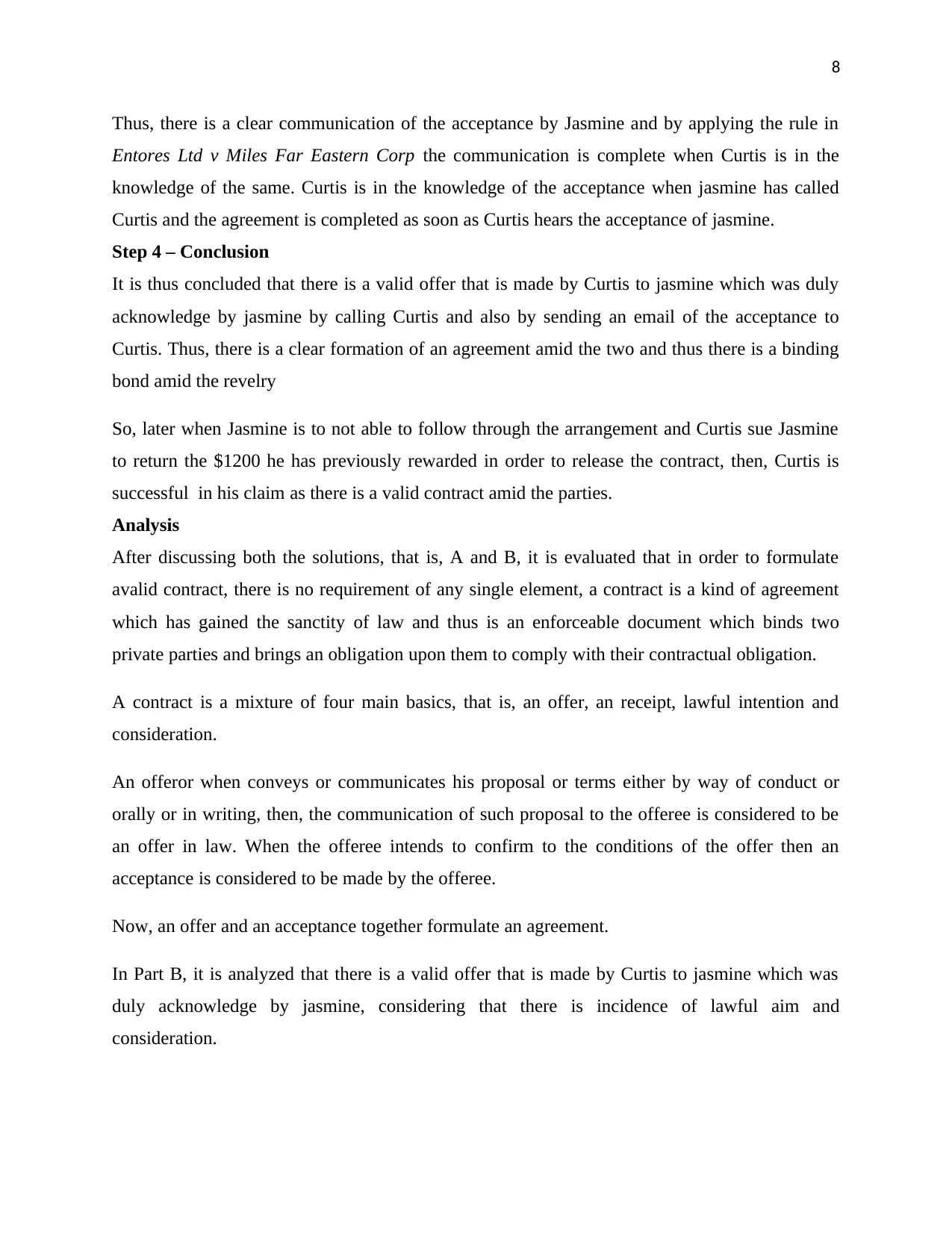
8
Thus, there is a clear communication of the acceptance by Jasmine and by applying the rule in
Entores Ltd v Miles Far Eastern Corp the communication is complete when Curtis is in the
knowledge of the same. Curtis is in the knowledge of the acceptance when jasmine has called
Curtis and the agreement is completed as soon as Curtis hears the acceptance of jasmine.
Step 4 – Conclusion
It is thus concluded that there is a valid offer that is made by Curtis to jasmine which was duly
acknowledge by jasmine by calling Curtis and also by sending an email of the acceptance to
Curtis. Thus, there is a clear formation of an agreement amid the two and thus there is a binding
bond amid the revelry
So, later when Jasmine is to not able to follow through the arrangement and Curtis sue Jasmine
to return the $1200 he has previously rewarded in order to release the contract, then, Curtis is
successful in his claim as there is a valid contract amid the parties.
Analysis
After discussing both the solutions, that is, A and B, it is evaluated that in order to formulate
avalid contract, there is no requirement of any single element, a contract is a kind of agreement
which has gained the sanctity of law and thus is an enforceable document which binds two
private parties and brings an obligation upon them to comply with their contractual obligation.
A contract is a mixture of four main basics, that is, an offer, an receipt, lawful intention and
consideration.
An offeror when conveys or communicates his proposal or terms either by way of conduct or
orally or in writing, then, the communication of such proposal to the offeree is considered to be
an offer in law. When the offeree intends to confirm to the conditions of the offer then an
acceptance is considered to be made by the offeree.
Now, an offer and an acceptance together formulate an agreement.
In Part B, it is analyzed that there is a valid offer that is made by Curtis to jasmine which was
duly acknowledge by jasmine, considering that there is incidence of lawful aim and
consideration.
Thus, there is a clear communication of the acceptance by Jasmine and by applying the rule in
Entores Ltd v Miles Far Eastern Corp the communication is complete when Curtis is in the
knowledge of the same. Curtis is in the knowledge of the acceptance when jasmine has called
Curtis and the agreement is completed as soon as Curtis hears the acceptance of jasmine.
Step 4 – Conclusion
It is thus concluded that there is a valid offer that is made by Curtis to jasmine which was duly
acknowledge by jasmine by calling Curtis and also by sending an email of the acceptance to
Curtis. Thus, there is a clear formation of an agreement amid the two and thus there is a binding
bond amid the revelry
So, later when Jasmine is to not able to follow through the arrangement and Curtis sue Jasmine
to return the $1200 he has previously rewarded in order to release the contract, then, Curtis is
successful in his claim as there is a valid contract amid the parties.
Analysis
After discussing both the solutions, that is, A and B, it is evaluated that in order to formulate
avalid contract, there is no requirement of any single element, a contract is a kind of agreement
which has gained the sanctity of law and thus is an enforceable document which binds two
private parties and brings an obligation upon them to comply with their contractual obligation.
A contract is a mixture of four main basics, that is, an offer, an receipt, lawful intention and
consideration.
An offeror when conveys or communicates his proposal or terms either by way of conduct or
orally or in writing, then, the communication of such proposal to the offeree is considered to be
an offer in law. When the offeree intends to confirm to the conditions of the offer then an
acceptance is considered to be made by the offeree.
Now, an offer and an acceptance together formulate an agreement.
In Part B, it is analyzed that there is a valid offer that is made by Curtis to jasmine which was
duly acknowledge by jasmine, considering that there is incidence of lawful aim and
consideration.
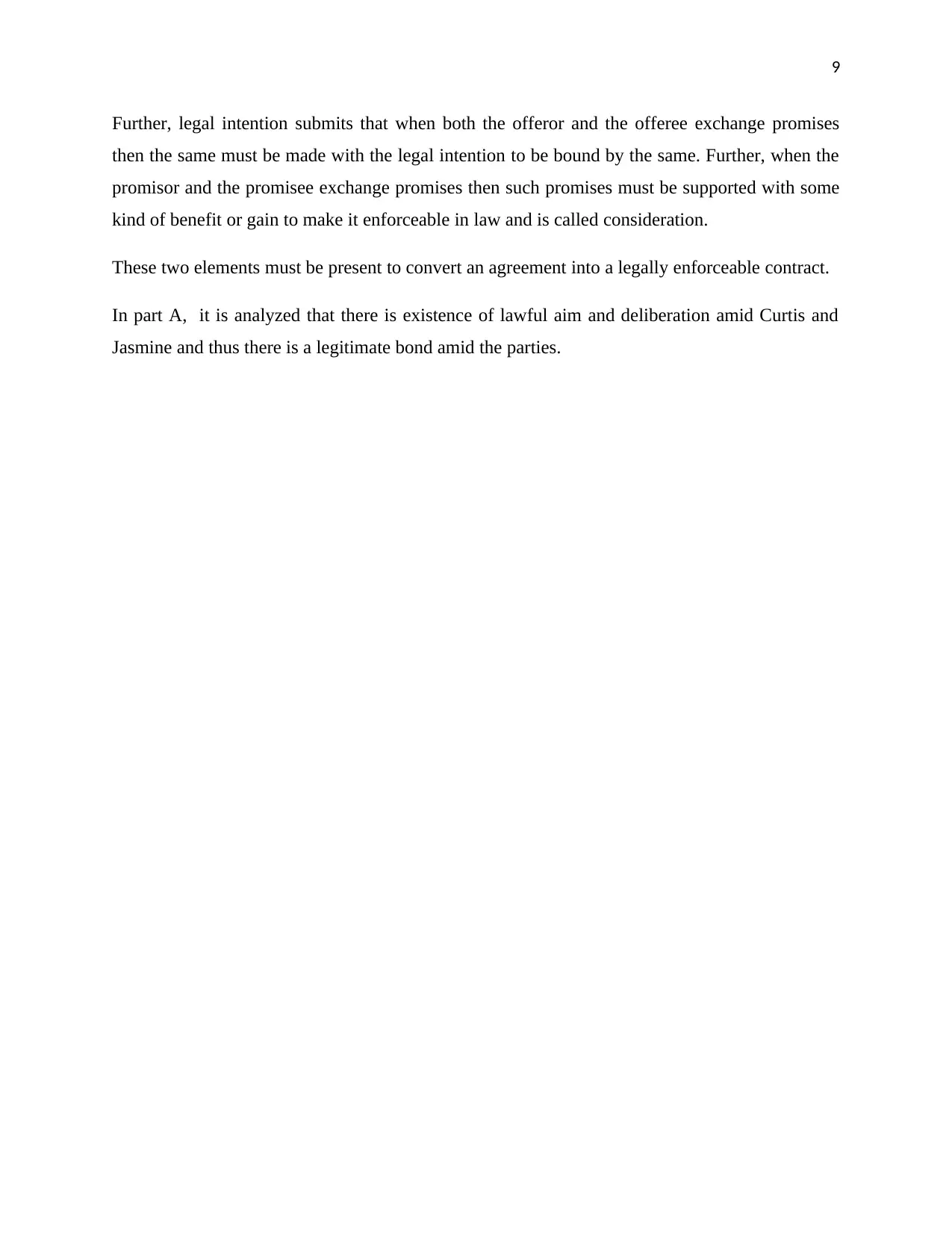
9
Further, legal intention submits that when both the offeror and the offeree exchange promises
then the same must be made with the legal intention to be bound by the same. Further, when the
promisor and the promisee exchange promises then such promises must be supported with some
kind of benefit or gain to make it enforceable in law and is called consideration.
These two elements must be present to convert an agreement into a legally enforceable contract.
In part A, it is analyzed that there is existence of lawful aim and deliberation amid Curtis and
Jasmine and thus there is a legitimate bond amid the parties.
Further, legal intention submits that when both the offeror and the offeree exchange promises
then the same must be made with the legal intention to be bound by the same. Further, when the
promisor and the promisee exchange promises then such promises must be supported with some
kind of benefit or gain to make it enforceable in law and is called consideration.
These two elements must be present to convert an agreement into a legally enforceable contract.
In part A, it is analyzed that there is existence of lawful aim and deliberation amid Curtis and
Jasmine and thus there is a legitimate bond amid the parties.
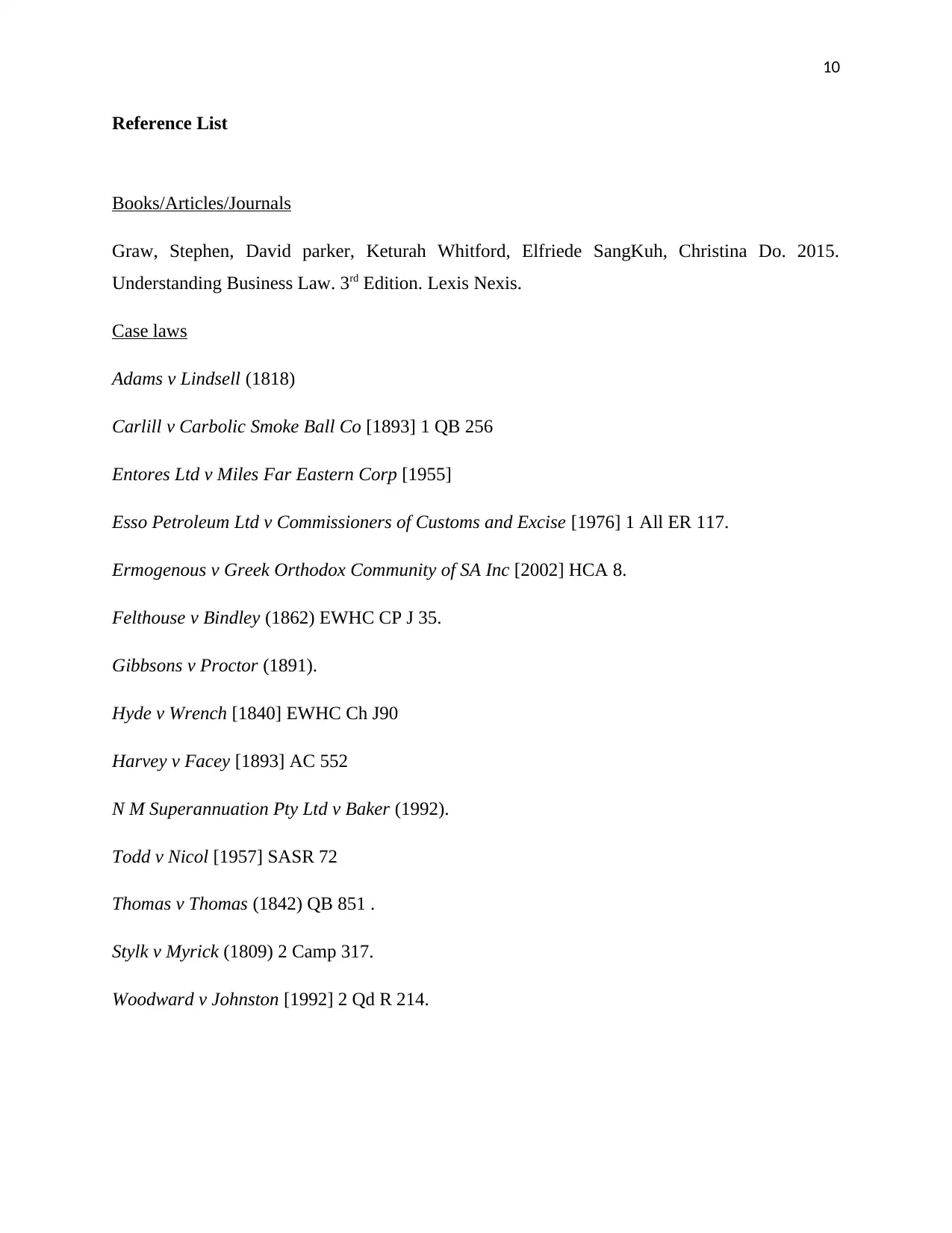
10
Reference List
Books/Articles/Journals
Graw, Stephen, David parker, Keturah Whitford, Elfriede SangKuh, Christina Do. 2015.
Understanding Business Law. 3rd Edition. Lexis Nexis.
Case laws
Adams v Lindsell (1818)
Carlill v Carbolic Smoke Ball Co [1893] 1 QB 256
Entores Ltd v Miles Far Eastern Corp [1955]
Esso Petroleum Ltd v Commissioners of Customs and Excise [1976] 1 All ER 117.
Ermogenous v Greek Orthodox Community of SA Inc [2002] HCA 8.
Felthouse v Bindley (1862) EWHC CP J 35.
Gibbsons v Proctor (1891).
Hyde v Wrench [1840] EWHC Ch J90
Harvey v Facey [1893] AC 552
N M Superannuation Pty Ltd v Baker (1992).
Todd v Nicol [1957] SASR 72
Thomas v Thomas (1842) QB 851 .
Stylk v Myrick (1809) 2 Camp 317.
Woodward v Johnston [1992] 2 Qd R 214.
Reference List
Books/Articles/Journals
Graw, Stephen, David parker, Keturah Whitford, Elfriede SangKuh, Christina Do. 2015.
Understanding Business Law. 3rd Edition. Lexis Nexis.
Case laws
Adams v Lindsell (1818)
Carlill v Carbolic Smoke Ball Co [1893] 1 QB 256
Entores Ltd v Miles Far Eastern Corp [1955]
Esso Petroleum Ltd v Commissioners of Customs and Excise [1976] 1 All ER 117.
Ermogenous v Greek Orthodox Community of SA Inc [2002] HCA 8.
Felthouse v Bindley (1862) EWHC CP J 35.
Gibbsons v Proctor (1891).
Hyde v Wrench [1840] EWHC Ch J90
Harvey v Facey [1893] AC 552
N M Superannuation Pty Ltd v Baker (1992).
Todd v Nicol [1957] SASR 72
Thomas v Thomas (1842) QB 851 .
Stylk v Myrick (1809) 2 Camp 317.
Woodward v Johnston [1992] 2 Qd R 214.
1 out of 10
Related Documents
Your All-in-One AI-Powered Toolkit for Academic Success.
+13062052269
info@desklib.com
Available 24*7 on WhatsApp / Email
![[object Object]](/_next/static/media/star-bottom.7253800d.svg)
Unlock your academic potential
© 2024 | Zucol Services PVT LTD | All rights reserved.





